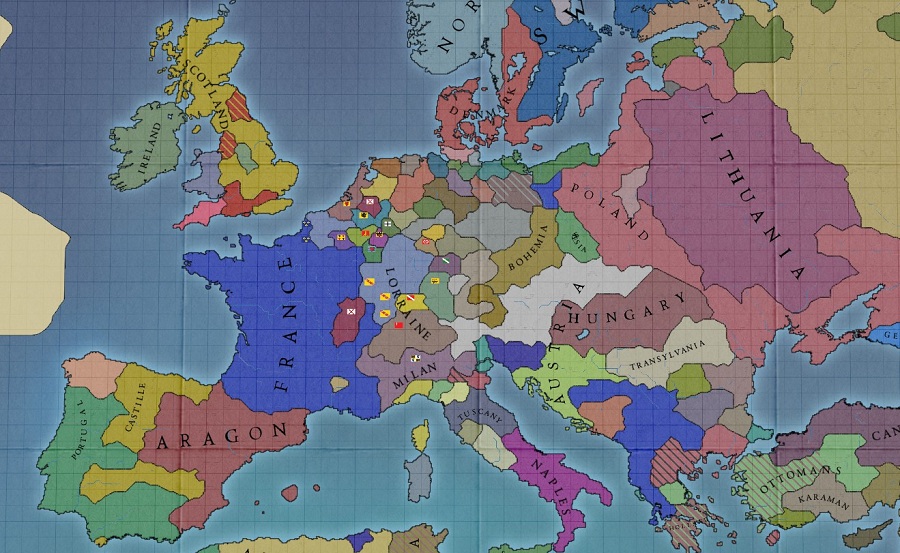Part 32: Lorraine Part 2: 1446-1484
Lorraine Part 2: 1446-1484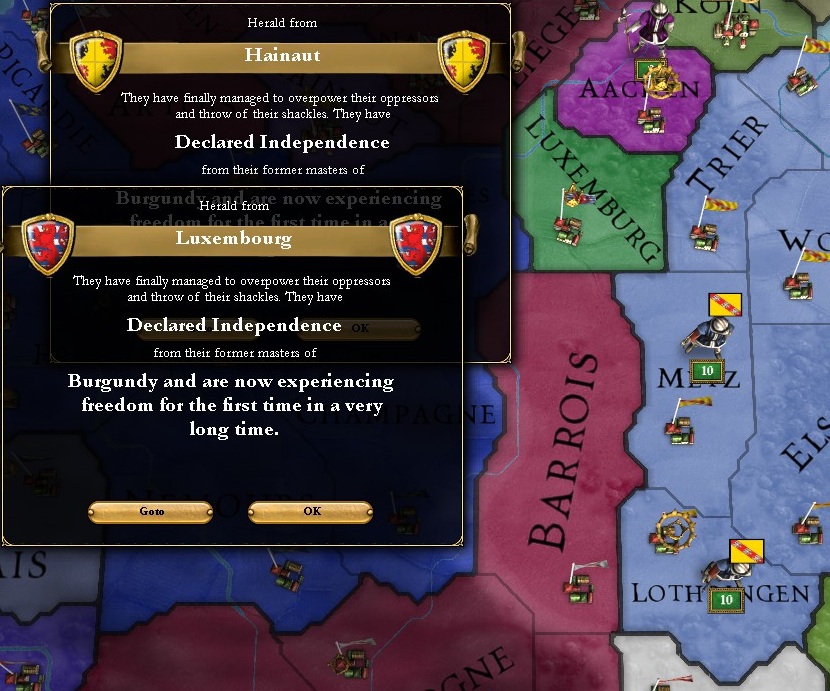
After a year of fighting, Burgundy suffers defeat at the hands of the French. They are forced to make several concessions, including the release of Luxemburg with which Francois Ettiene forms strong bonds.
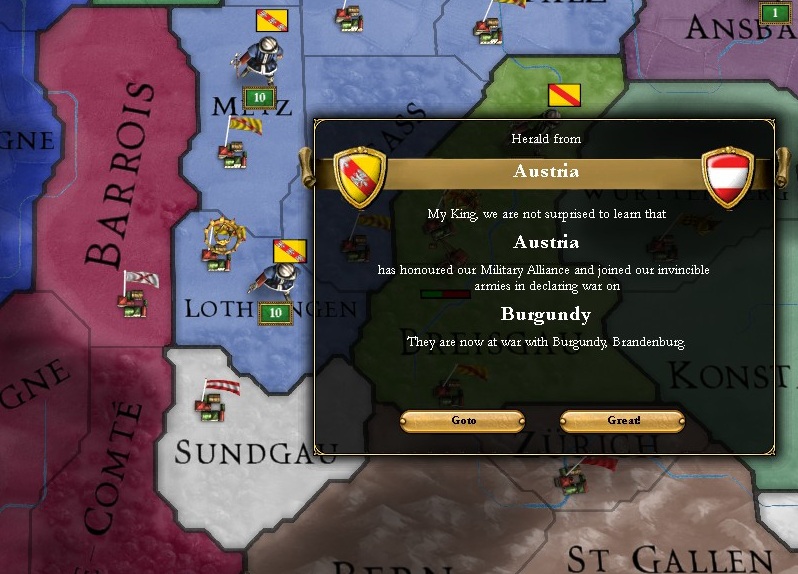
Francois knows that if they are ever to pursue their claims on Barrois, now is the time. He issues a declaration of war against the weakened Burgundy and orders Lorranian troops into Burgundian lands. Even the Emperor himself recognizes our claims on this territory, and Austria joins us in our cause.
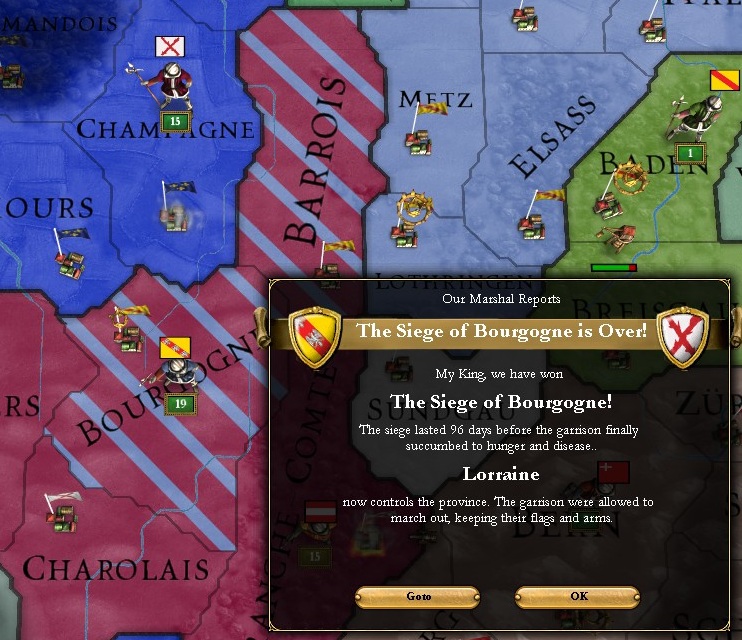
Lorrainian troops blaze a trail through Burgundy as the weakened Burgundian army hides in the French countryside. Barrois falls first, then the army continues on to occupy the Burgundian capital. Austrian troops arrive from the east and begin laying siege to Franche-Comte.
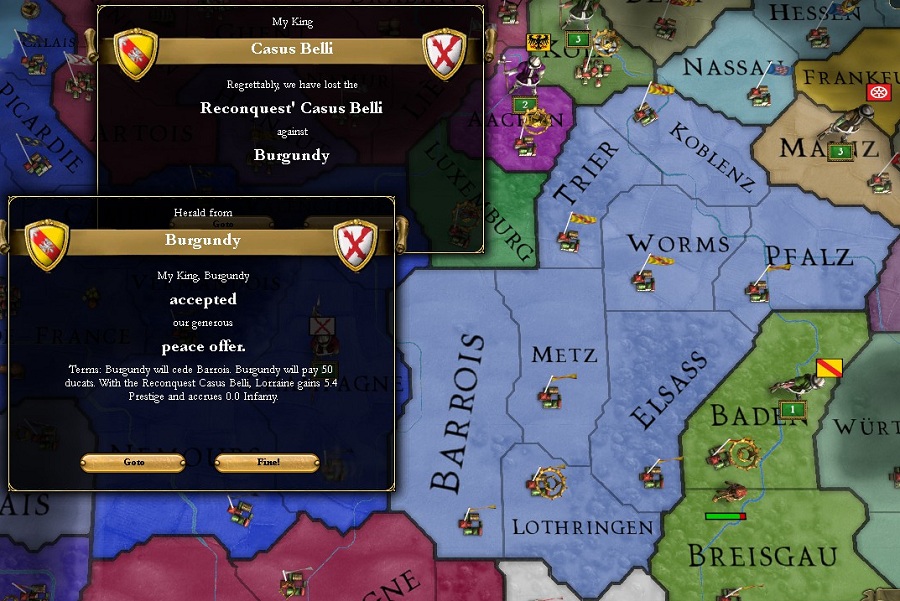
The Duke of Burgundy gives into this pressure and cedes the province of Barrois to Lorraine.
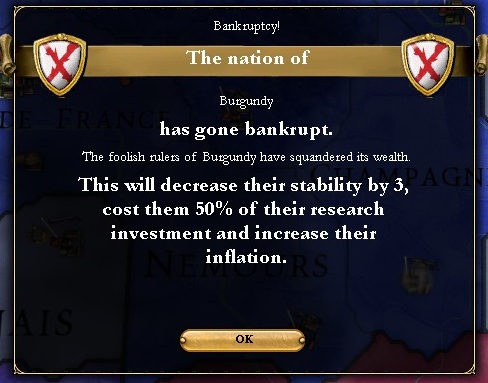
The stress of two ruinous wars was too much for the Duchy of Burgundy to handle economically, and their state goes bankrupt. This causes the Flemish people in the Lowlands to rise up against Burgundian rule. The rebels succeed against the weakened Burgundy and form the small state of Flanders. Burgundy manages to hold onto the wealthy port of Antwerp, however.
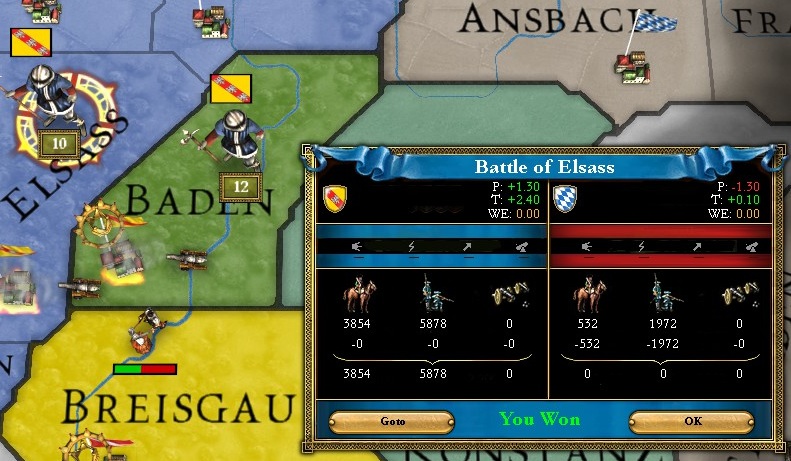
Baden has suffered from turmoil in recent times, as well. Alsacian nobles instigated a rebellion in Baden's southern province and successfully seized it. The weakened Baden approached Bavaria for protection, becoming a vassal state of the larger nation. Francois did not approve of this. Lorraine has claims on the province of Baden, and he is unwilling to let Bavaria expand their influence on it. War is declared on Baden, and Bavaria comes to their aid along with their allies.
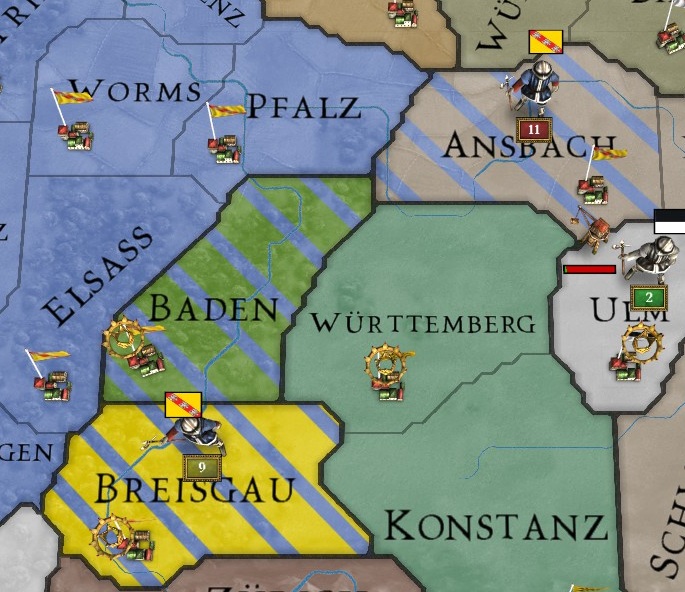
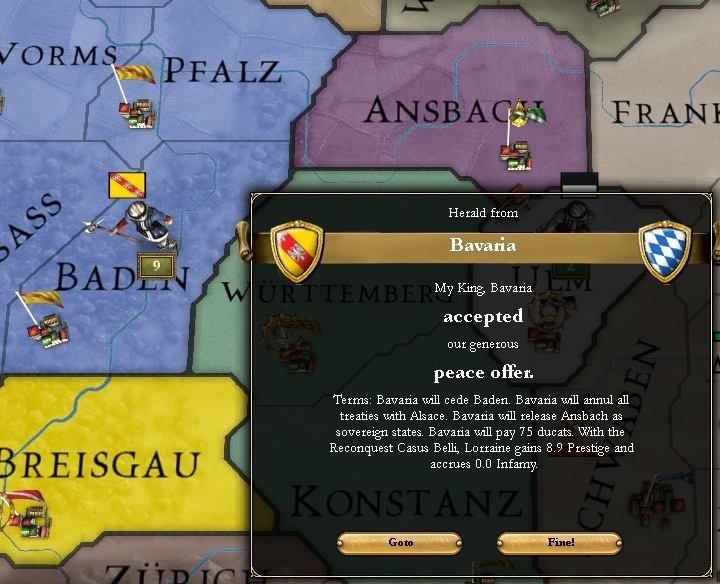
The Bavarian alliance sees no success in battle against Lorrainian troops, and they agree to cede the province of Baden. Francois also demands the severing of any relationships with Alsace, and the release of Ansbach in order to provide a buffer between their two states.
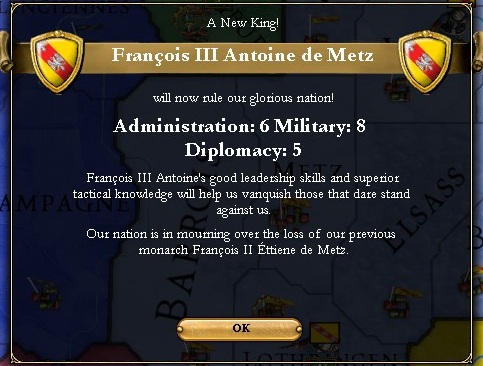
In 1458, 6 years after the conquest of Baden, Francois Ettiene passes away, leaving the Duchy of Lorraine to his son Francois III Antoine. Francois Antoine resembles his uncle Charles in demeanor and ability, combining a brilliant military mind with an otherwise well rounded education.
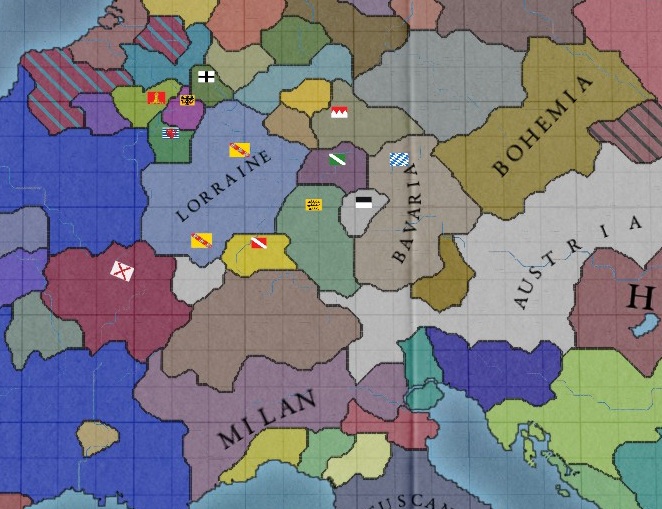
Francois Antoine takes the throne at a time when Lorraine is the most powerful Duchy in the region. While Bavaria, Thuringia, and the republic of Switzerland are equal in size, the strength of their military and economy cannot compare. With the collapse of Burgundy's dominance, Lorraine's biggest threat lies outside of the Empire - from France.
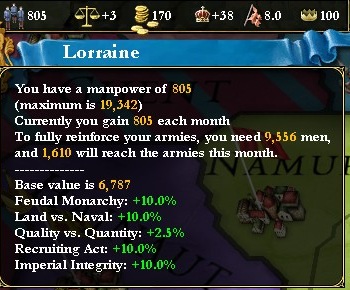
While Lorraine's army is powerful, its manpower reserves are quite modest. Francois Antoine recognizes this as a deficiency that can be overcome. Military camps and barracks are ordered to be constructed on a large scale across the country to maximize the size and quality of reserve forces.
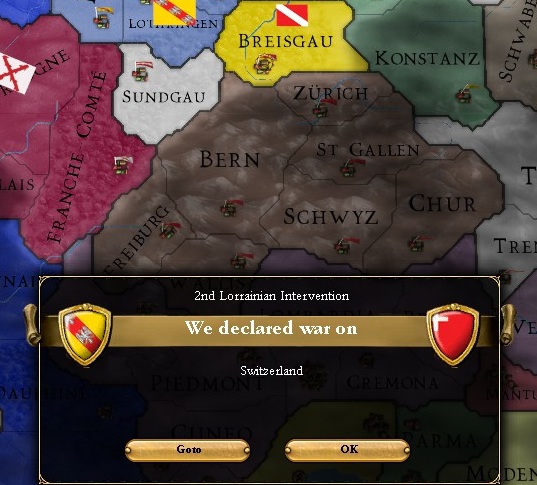
As Lorraine begins spreading its influence on surrounding minor powers, it runs into opposition from other states trying to meddle in its affairs. Switzerland and Bavaria both focus a great deal of attention on Alsace, while Lorraine attempts to maintain its own dominance over the small state. This friction eventually leads to a war against Switzerland.
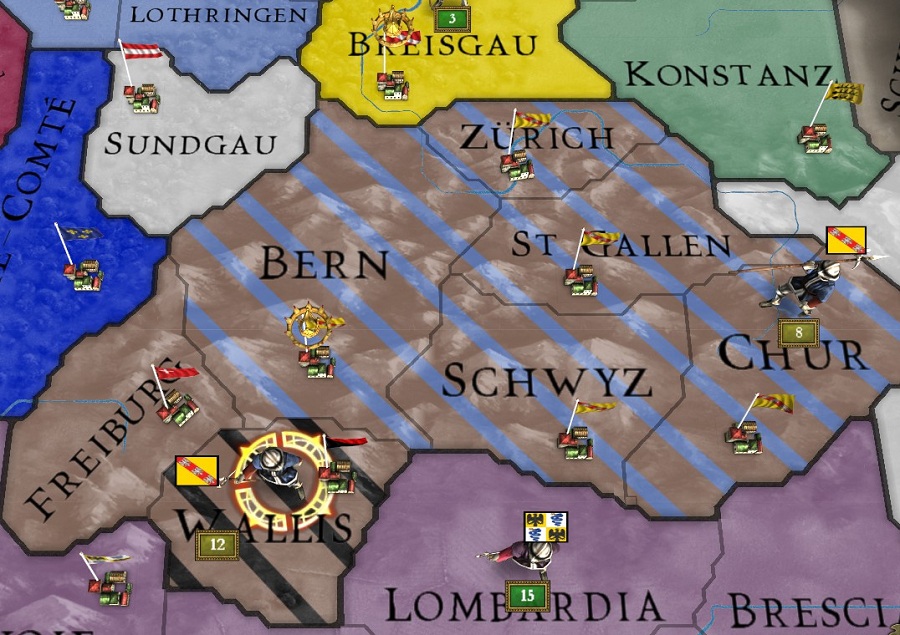
Switzerland is unable to stand up against a Lorrainian army that is larger, better equipped, and more skillfully lead than their own.
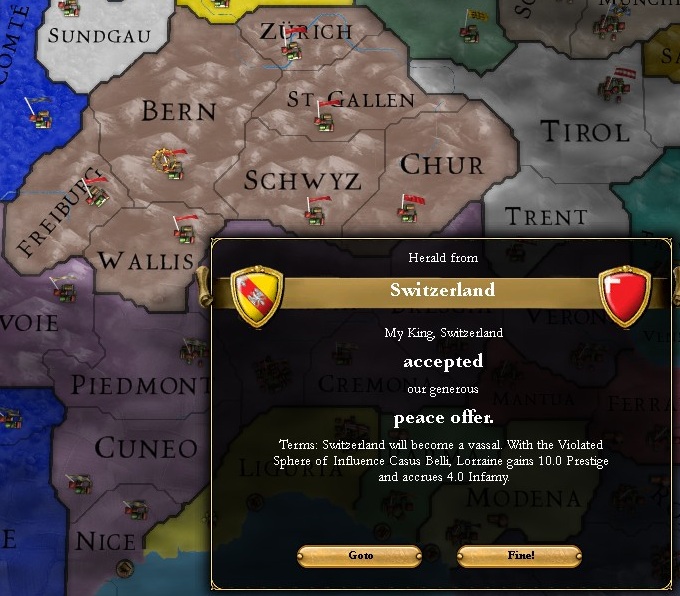
By 1460, the entirety of Switzerland is under occupation, and the republic is forced to become a vassal state of Lorraine.
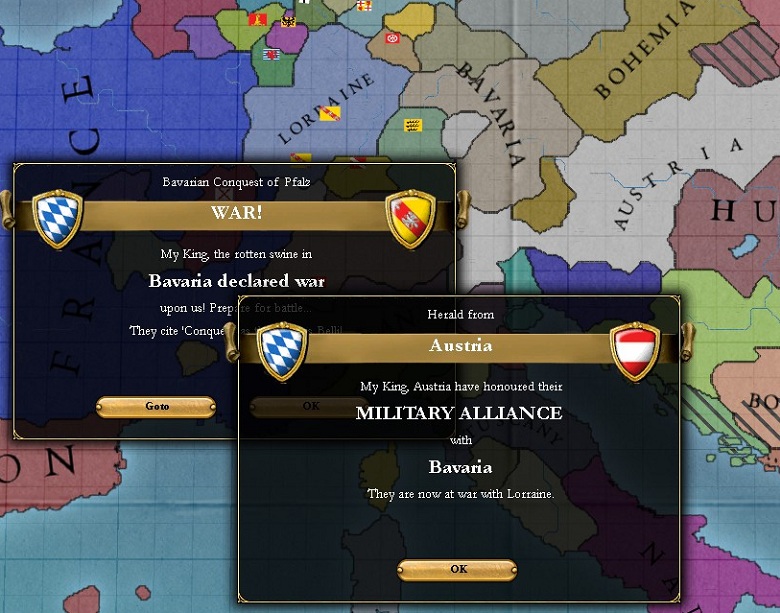
Nearly a decade of peace passes. Francois Antoine's military policies strengthen Lorraine's manpower reserves as much as anyone could hope for. In 1469, Bavaria invades Lorraine to conquest lands that they propose they have claims on. Austria comes to the aid of Bavaria, angry over our refusal to return illegally held territory. Lorraine's only ally in this conflict is the small nation of Liege, which broke away from Burgundy and has since become a partner in a personal union under the Duke of Lorraine.
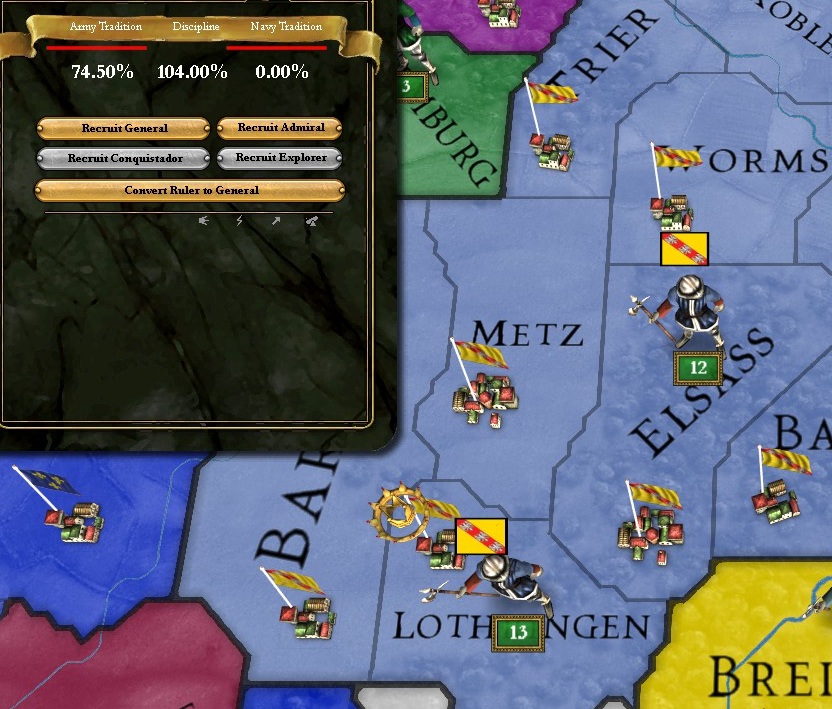
Lorraine's army has grown stronger over the years, numbering at about 25,000 men. It also has a strong army tradition which has been cultivated by its wars against Burgundy, Switzerland, Bavaria, and in other minor conflicts. Francois Antoine draws on this history of tradition to promote two generals to lead Lorraine's armies in the upcoming war.
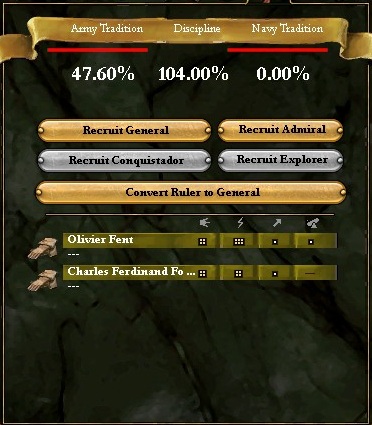
Olivier Fent, otherwise known to the Austrians and Bavarians as "That goddamn guy" takes command of Lorraine's 1st Army. His mastery over a broad range of battlefield tactics makes him arguably the best general in Europe - if not the world. Charles Ferdinand Forthober commands our second army with his own style of brilliance.
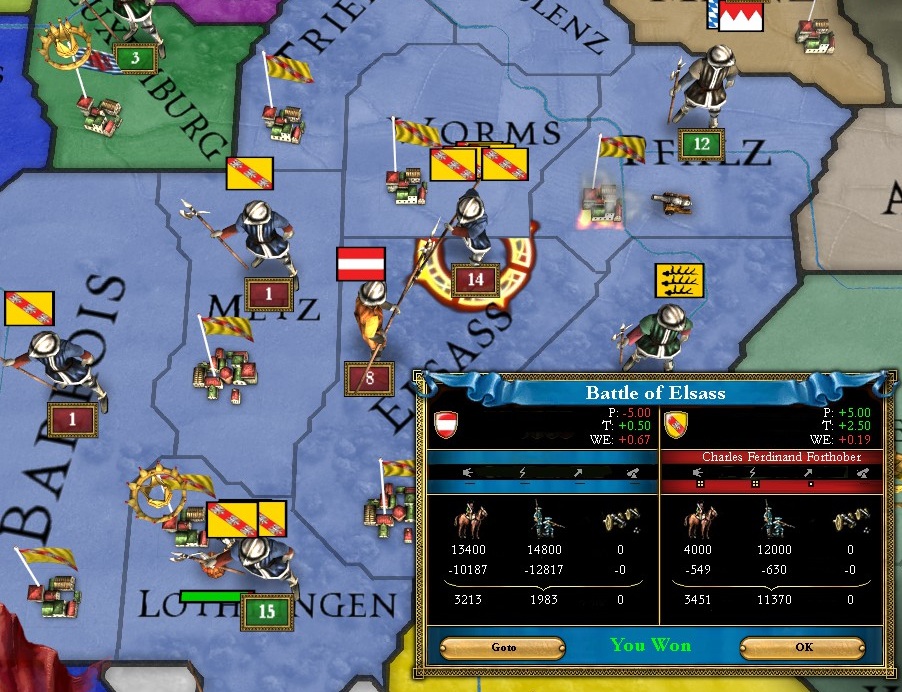
Austrian and Bavarian troops arrive in Lorraine in 1470 just as reserve troops are being called up. A large Austrian force lead by a minor noble with no particular qualifications comes up against General Forthober's 2nd army and is devastated in a single battle. The survivors are run down and killed, routed, or held for ransom.
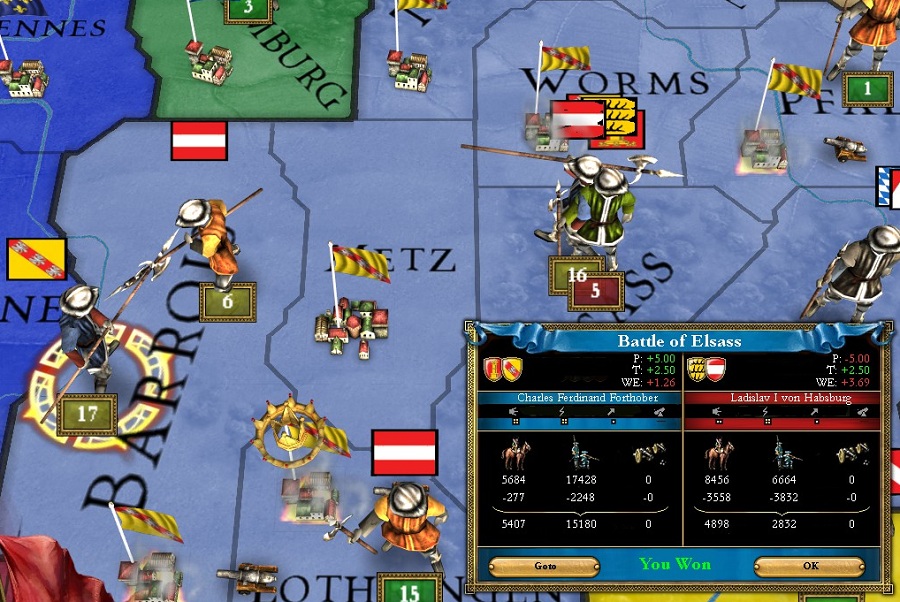
The Austrian Emperor charges into battle against a larger combined force of Liege and Lorraine, but he is repelled.
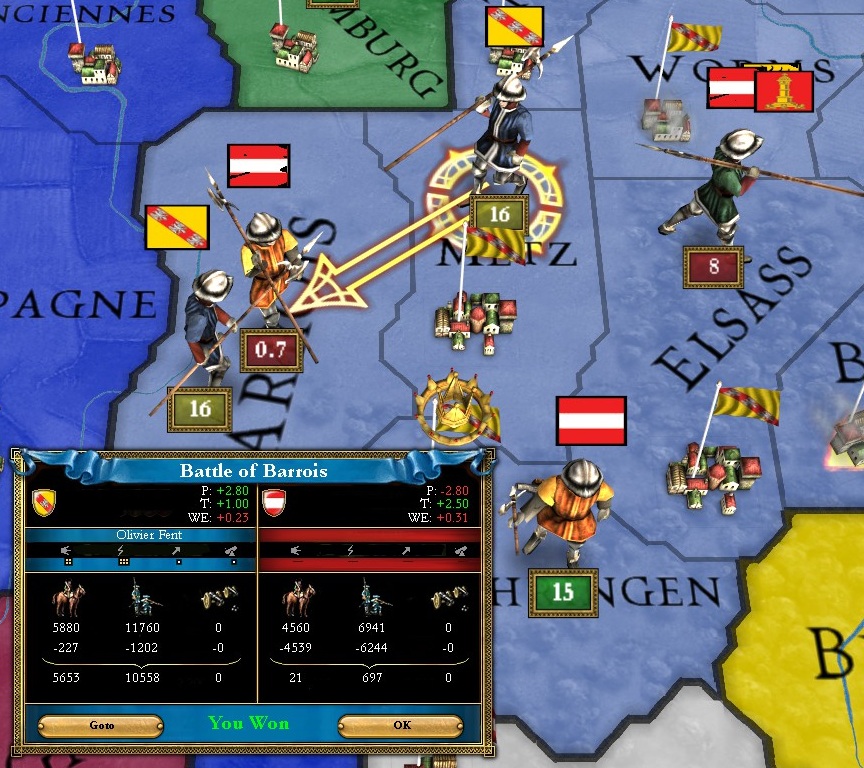
General Fent rushes to rescue the garrison at Barrois and nearly destroys the entire sieging force.
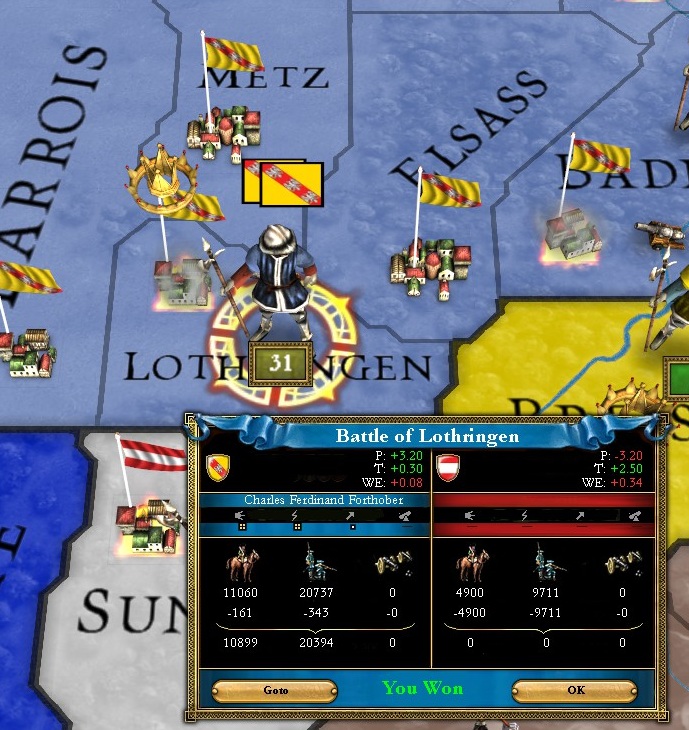
The combined 1st and 2nd Lorranian armies march on the capital of Lothrnigen and annihilates a large siege force left there under the command of another Austrian noble with no battlefield experience.
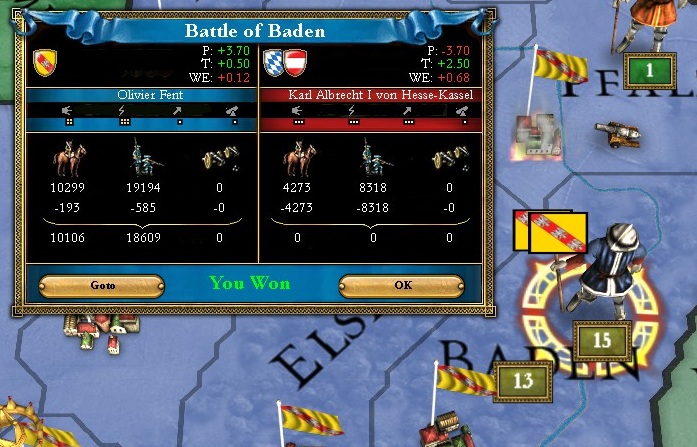
General Fent marches east to meet a combined Austrian and Bavarian force lead by the Duke of Bavaria, completely destroying it as well. The countryside of Lorraine has been purged of invaders for the time being.
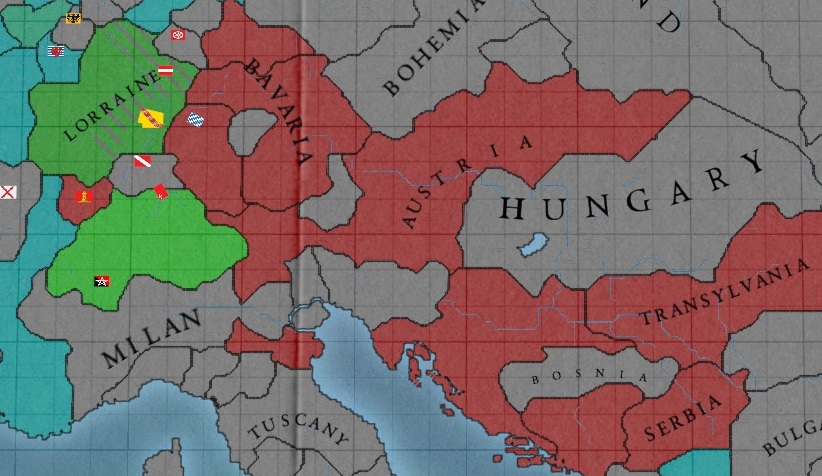
The alliance that Bavaria managed to organize against us should have been unstoppable by their manpower advantages alone, but Generals Fent and Forthober have saved Lorraine.
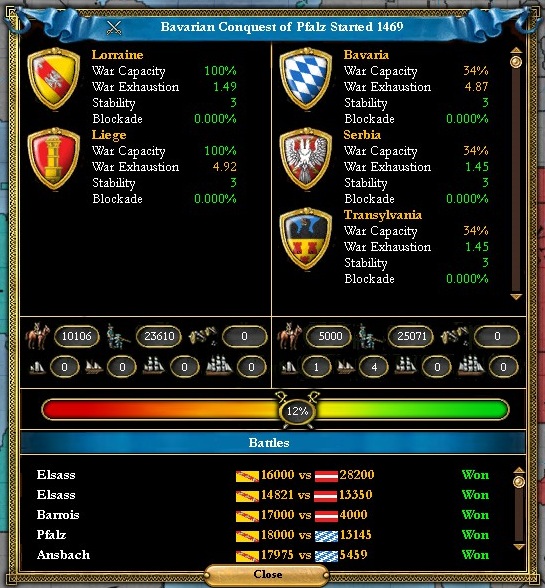
Only a half year after the beginning of their invasion, the combined forces of Bavaria, the Austrian Emperor, and all of their allies now number fewer than the combined forces of Lorraine and Liege.
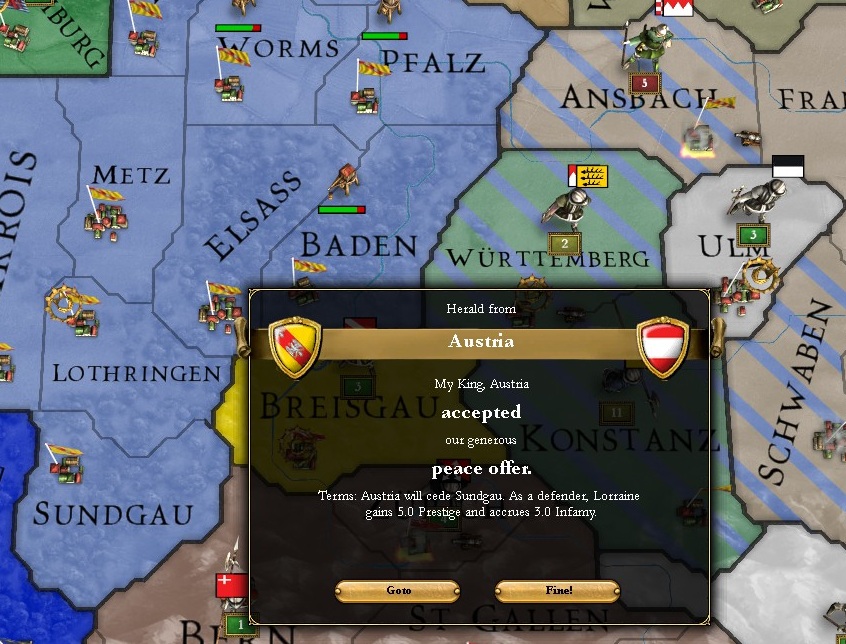
Austria is persuaded to surrender Sungau to Lorraine in return for peace.
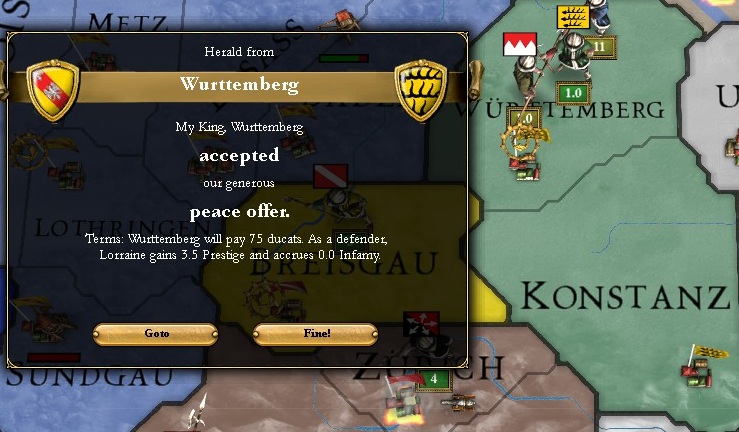
Wurttemberg is forced to pay reparations for losses that Lorraine suffered as a result of the fighting.
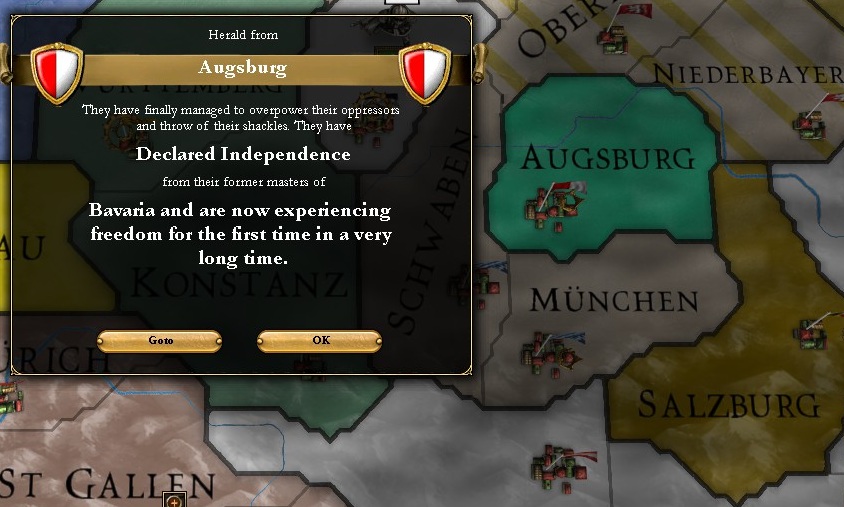
A separate invasion of Bavaria by Bohemia and Salzburg begins to show results as Salzburg demands the release of Augsburg.
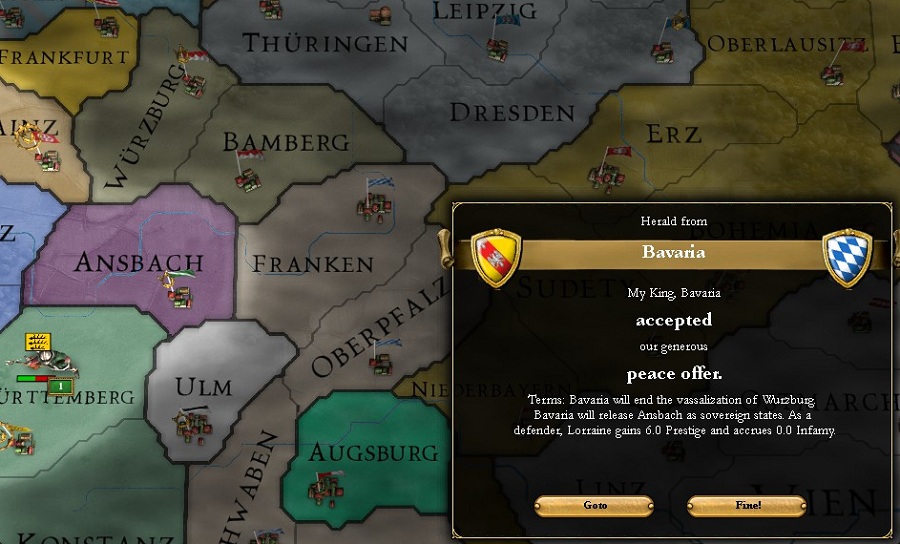
When peace is finally signed with Bavaria, Francois Antoine focuses on the reduction of Bavaria's strength rather than any further addition to Lorranian holdings.
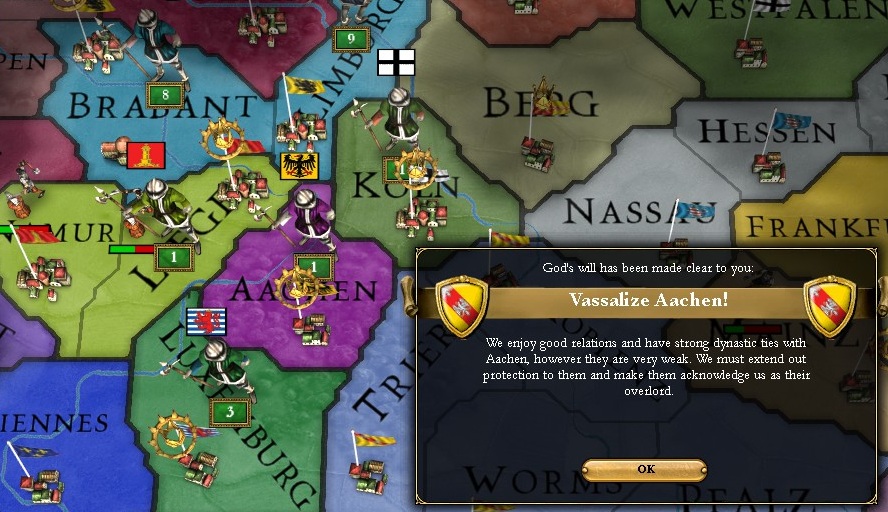
In later years, the opportunity presents itself to vassalize the small nation of Aachen, giving us a more direct connection to our union partner of Liege.
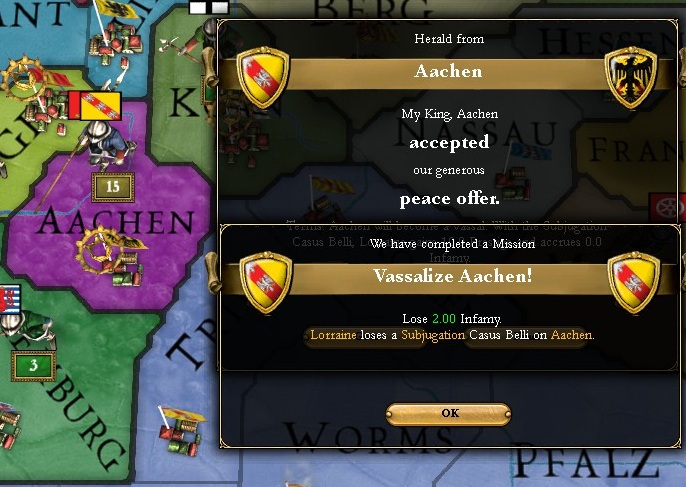
After subjugating Aachen by force, Francois' diplomats, unwilling to be outdone by General Fent, arrange for Flanders to become a vassal state of Lorraine as well.
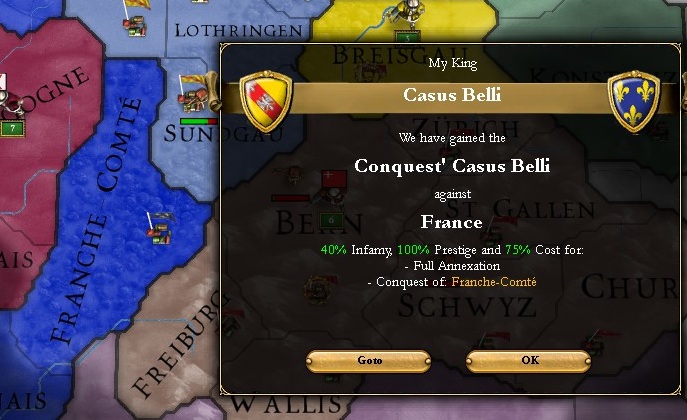
Advisors begin discussing the economic and strategic benefits that could come from owning the province of Franche-Comte, and urge Francois to consider claiming it at the earliest possibly opportunity. The Kingdom of France is far too powerful to make an opponent of right now, however.
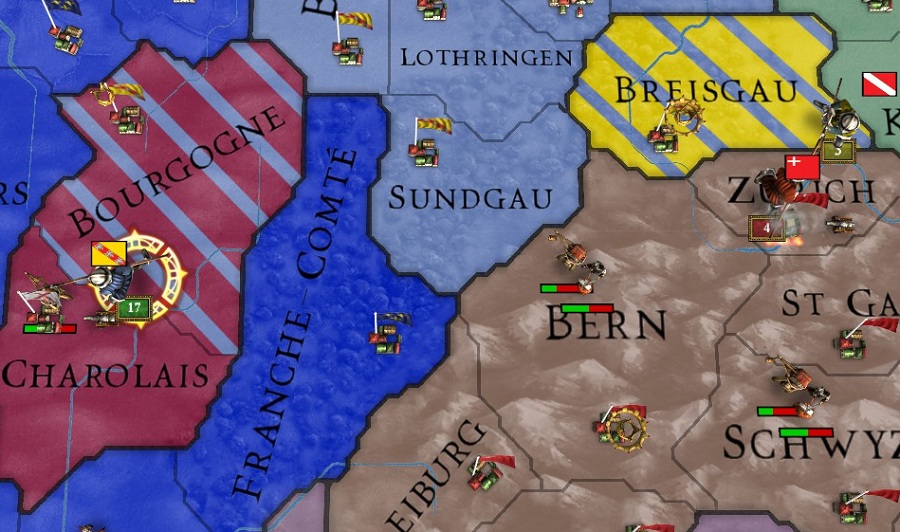
Burgundian interference with Alsace leads to another war over the small country. Burgundy isn't the mighty foe it once was, though. Lorrainian armies are easily able to occupy its southern territory.
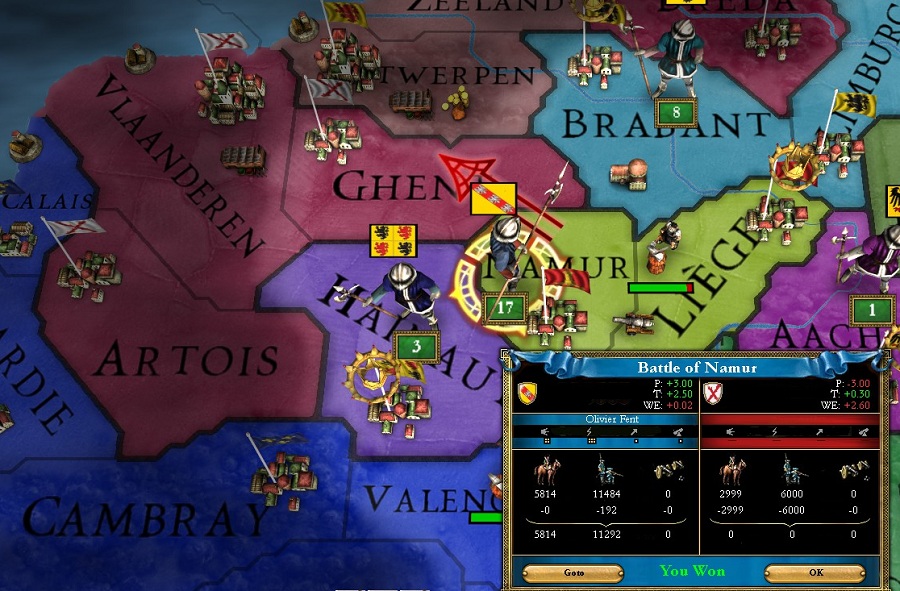
General Fent destroys the Burgundian forces in the north, outside of Liege.
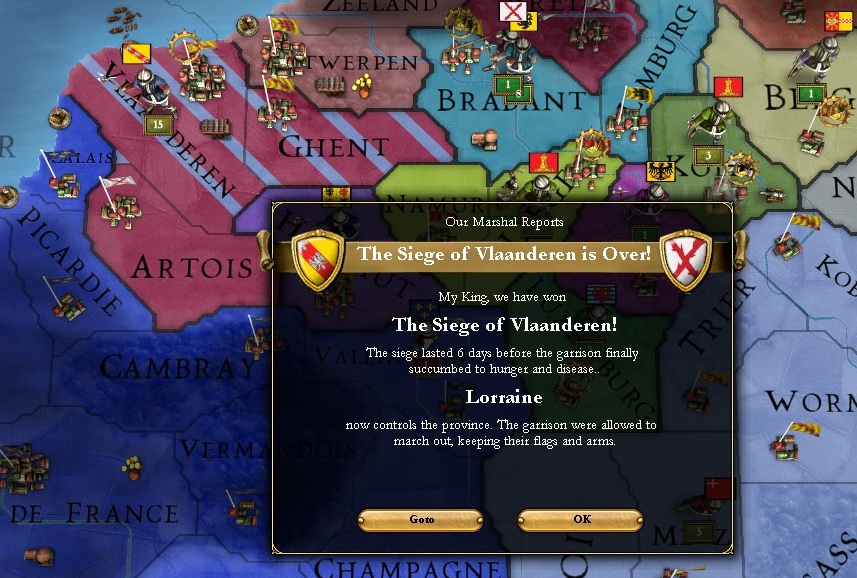
With Burgundy's forces gone, their northern holdings begin to fall to our 1st Army.
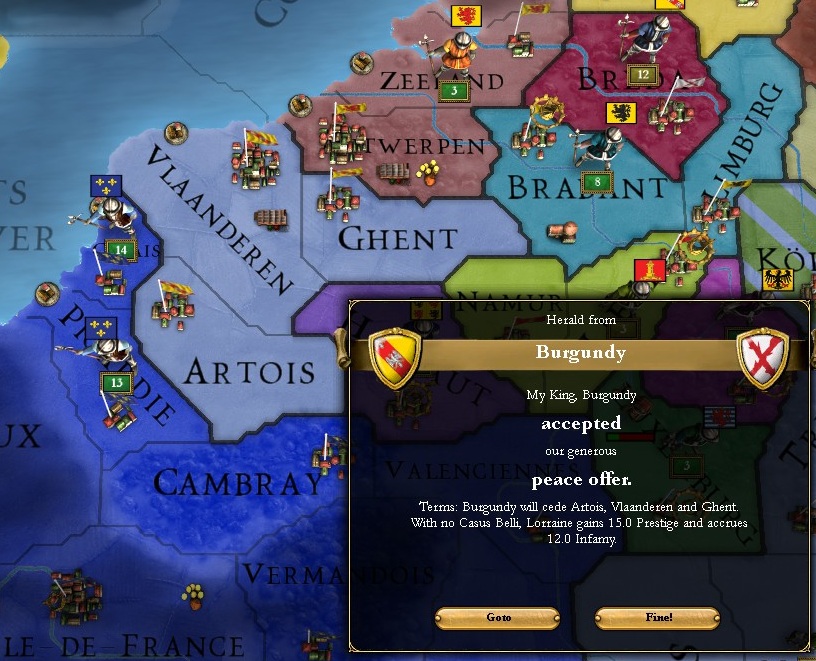
Francois makes a bold move by seizing the majority of Burgundy's remaining northern holdings. His eagerness for claiming lands that he has no right to is worrisome to other noble houses, but as these provinces are technically outside of Imperial territory, the worries are somewhat fleeting.
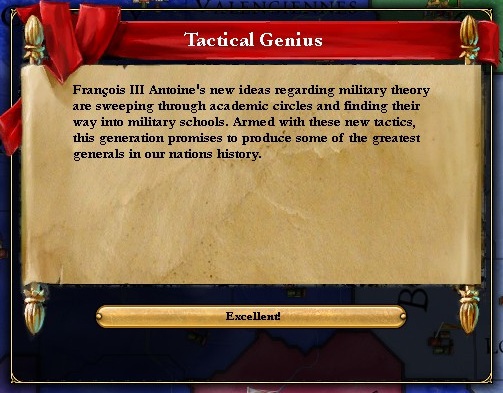
The wars against Austria, Bavaria, and Burgundy have demonstrated the true scope of Francois' military skill. As generals Fent and Forthober grow old and retire from the battlefield, new generals of similar ability are called up from the ranks to take their places.
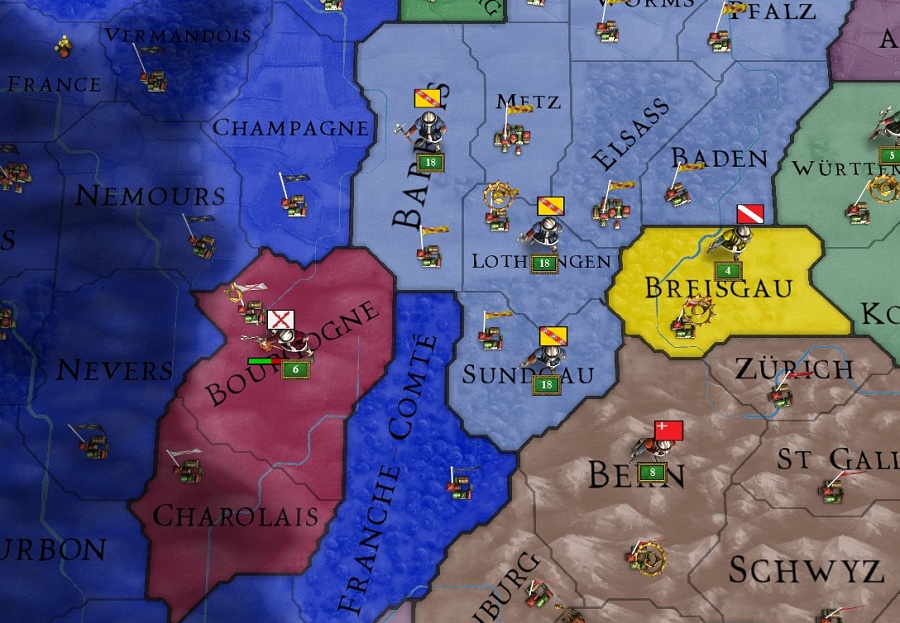
The Alsacian nobles in Breisgau are finally convinced to become a vassal state of Lorraine, preventing any further trivial wars over the small country. Lorraine's army swells to over 50,000 men as Francois Antoine considers which direction the Duchy should take next.
Country Ratings
Economy
Technology
Military
Central Europe in 1484
